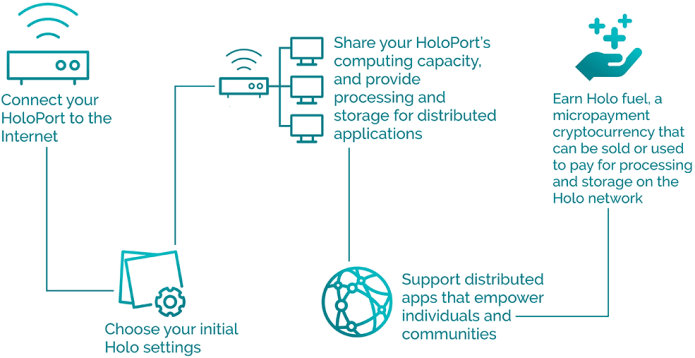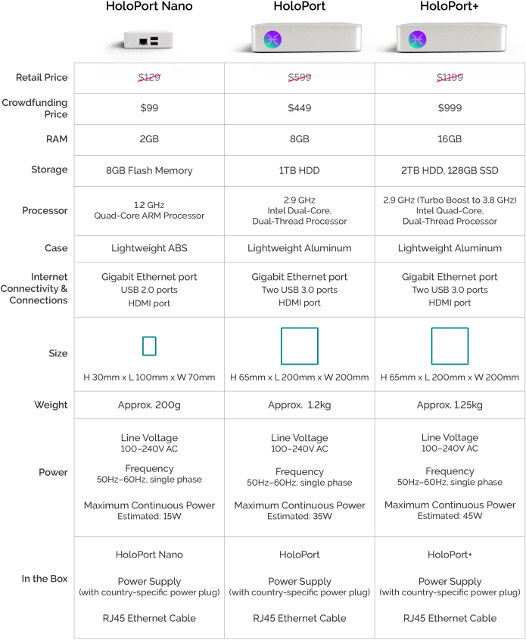The Internet is now mostly centralized, for example most people search with Google, and Facebook dominates the social media space in many countries. That also means access to content can easily be blocked by governments, and many companies will use your personal data to their benefits.
Holo network promises to “take back the Internet” thanks to a P2P distributed web hosting system, where people hosts app from developers in their HoloPort devices, and get paid for hosting crypto apps in Holo Fuel cryptocurrency that can in turn be used to pay for processing power and/or storage on the network, or converted into other cryptocurrencies like Bitcoin, or fiat money (Dollars, Euros…).
 It’s like a new Internet that uses the current “pipes” (i.e. you’d still need Internet through your ISP), but all content would have to be created from the ground up. It basically aims to replace datacenters, websites, and app from larger companies. The first prototype crypto apps include
It’s like a new Internet that uses the current “pipes” (i.e. you’d still need Internet through your ISP), but all content would have to be created from the ground up. It basically aims to replace datacenters, websites, and app from larger companies. The first prototype crypto apps include
- Clutter – a P2P Twitter clone
- Fractal Wiki – a serverless Wiki of cards within cards within cards
- HoloChat – a Slack-like multi-channel chat room for teams
- DPKI – a secure, decentralized cryptographic key management too
App / website developers would pay for Holo network, just like they pay for hosting services currently, and people are incentivized to buy HoloPort hardware as they could eventually get their money back and make some if the system is popular. You’d still use your web browser to access crypto apps (just type an URL) in the Holo P2P network, and other websites in the “centralized Internet”.
Three types of HoloPort – basically Linux computers – are available with HoloPort Nano based on a quad core ARM processor with Gigabit Ethernet, and larger HoloPort & HoloPort+ powered by more powerful Intel processors, and equipped with more memory and storage.

Holo and Holo Fuel are based on Holochain described as “a next-generation platform that is more scalable, exponentially faster, far more energy efficient, and 10,000x cheaper than blockchain”. More details can be found in this document (PDF), and you can checkout the software on Github. The project is still at the alpha stage with the first stable release expected in Q2 2018. The company is now raising funds through and Initial Community Offering (not available in the US), and an Indiegogo campaign where they offer HoloPort hardware as rewards.
The crowdfunding effort started on a roll, as Holo has already received over $220,000 in pledges from around 530 backers. HoloPort Nano requires a $99 pledges, while the Intel platforms cost $449 or $999. Currently the pledges are fairly evenly distributed among the three platforms because the idea is that you’ll be able to serve more users with a faster computer, hence earn more Holo Fuel. Altough the start of the Indiegogo campaign is impressive, the whole project is quite ambitious, so we’ll have to see how it turns out. But in the worst case, with the project failing, you’d still have a Linux computer to play with. [Update: Alternatively, if you don’t want to buy hardware for it, but still want to support the project, you could pledge $40 for the Alpha/Beta Tester rewards to get early access to Holo and Holochain app developer tools].
More details may also be available on holo.host website.

Jean-Luc started CNX Software in 2010 as a part-time endeavor, before quitting his job as a software engineering manager, and starting to write daily news, and reviews full time later in 2011.
Support CNX Software! Donate via cryptocurrencies, become a Patron on Patreon, or purchase goods on Amazon or Aliexpress




